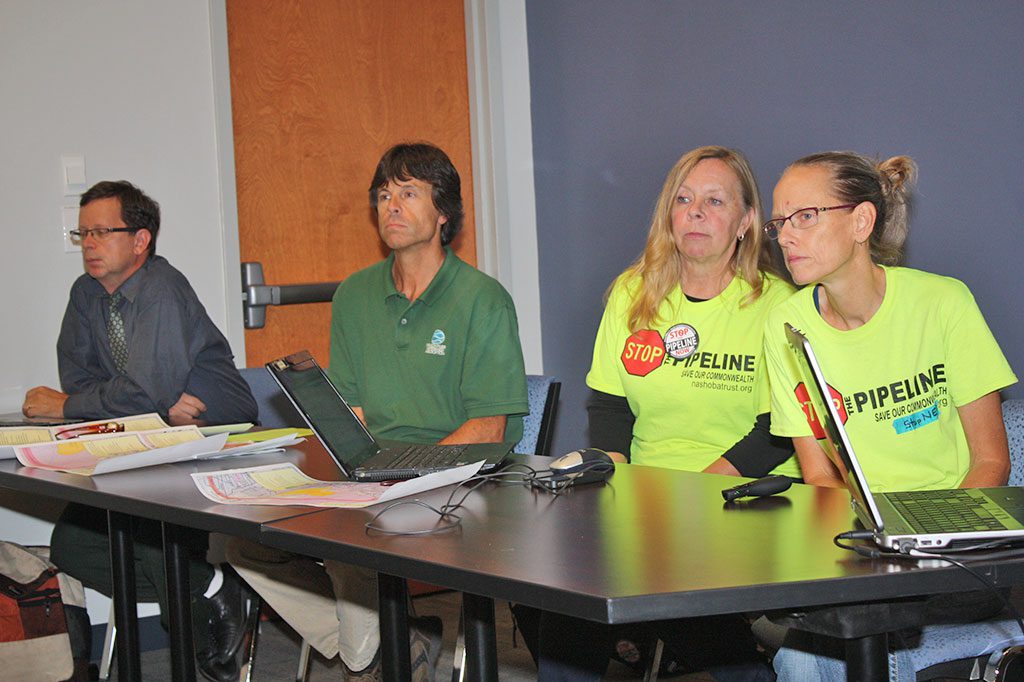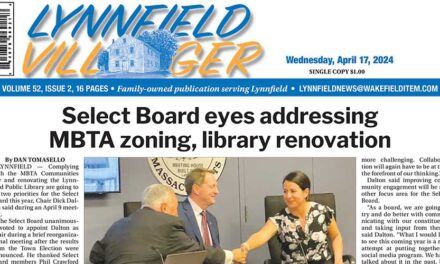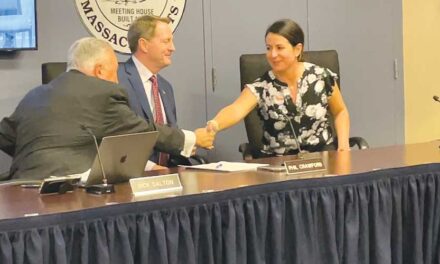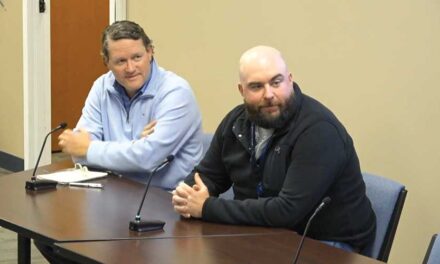
A NUMBER OF environmental concerns about Kinder Morgan’s controversial proposal to construct a 20-24 inch high pressure natural gas pipeline into Massachusetts and New Hampshire was raised by, from left, Pipeline Awareness Group Co-Chairman Rich Cowan, Ipswich River Watershed Association Executive Director Wayne Castonguay, and Stop Northeast Energy Direct (NED) Coalition Organizers Paula Terrasi and Cathy Kristofferson, during an informational meeting at the Al Merritt Center on Sept. 10. (Dan Tomasello Photo)
Published in the September 16, 2015 edition
By DAN TOMASELLO
LYNNFIELD — The potential environmental impact of Kinder Morgan’s controversial natural gas pipeline proposal could have a negative effect on the town’s water supply, a group of pipeline opponents told two-dozen attendees at an informational meeting held at the Al Merritt Media and Cultural Center on Sept. 10.
The informational meeting, organized by Selectman Tom Terranova, was the second forum held on the proposed Kinder Morgan Northeast Energy Direct (NED) pipeline project. A similar informational meeting was held in August.
The proposed Kinder Morgan pipeline, known as the Lynnfield Lateral, will be 24 inches in size. Kinder Morgan wants to bring the high pressure natural gas pipeline into Massachusetts and New Hampshire from the Marcellas Shale region of Pennsylvania and upstate New York.
The proposal has had dozens of communities in each of the states up in arms as private homeowners, landowners, businesses and government entities alike push back against the private company’s request to survey properties that would be encumbered by permanent easements along its meandering route.
In Lynnfield, the project would affect Chestnut Street, Willis Lane, North Hill Drive and surrounding streets. The pipeline would also run in close proximity to the Lynnfield Center Water District.
Kinder Morgan is currently preparing to file its permits with the Federal Energy Regulatory Commission (FERC), the agency that has jurisdiction over pipeline projects, in October.
Water concerns
Ipswich River Watershed Association Executive Director Wayne Castonguay gave an overview of the pipeline’s impact on the Ipswich River and the town’s water supply.
Castonguay said the Ipswich River Watershed is located in one-third of Lynnfield. He said the proposed pipeline would be located in close proximity to the Ipswich River.
“The Ipswich River is a beautiful resource and it is at risk because of this project,” said Castonguay. “This is by far the largest development project and most impactful project in the history of the Ipswich River.”
Castonguay said the Ipswich River Watershed Association is concerned about Kinder Morgan’s project for a variety of different reasons. He said 11 miles of the pipeline’s route would travel through the watershed. He said the pipeline would be located near the riverbank and Kinder Morgan would have to remove trees in order to construct the pipeline.
According to Castonguay, the pipeline project would impact buffer zones, conservation areas, recreation areas and interior forest species as well.
“The pipeline would take all of the interior forest habitat from (Lynnfield’s) forests away,” said Castonguay.
Castonguay said the pipeline project would require a 100-foot wide construction clearing and a 50-foot wide swath, which would be “permanently maintained” by herbicides.
“You can’t mechanically or physically mow this land, so we are very concerned about the chemicals that will be used,” said Castonguay.
Castonguay also said the pipeline would be “in close proximity to seven public water supply intakes.” He said the Ipswich River is the “life’s blood of the upper North Shore” and noted 34 million gallons of water from the Ipswich River is used for people’s drinking water “every single day.”
“Three hundred and thirty thousand people depend on (the river) for their drinking water,” said Castonguay. “And another 20,000 businesses depend on it.”
Castonguay said the pipeline would impact the Lynnfield Center Water District as well. He also said the project would impact wells by causing them to “potentially dry up” because the pipeline project would require a new underground conduit to be built, which would “take away water that would otherwise go to your well and move it off to a different aquifer away from your water supply.”
The Ipswich River Watershed executive director personally thanked local officials for working to change the pipeline’s original route. However, Castonguay said the pipeline would “still have a direct impact on your public water supply.”
Meter station impacts
Pipeline Awareness Group Co-Chairman Rich Cowan discussed the impact of the proposed meter station that Kinder Morgan wants to construct in town as part of the project. Natural gas companies such as Kinder Morgan place meter stations periodically along interstate natural gas pipeline routes to monitor natural gas in their pipes.
“It’s a significant facility,” said Cowan.
Cowan said the meter station is an “industrial facility that should not be located near homes.” He said a meter station’s blowers, which serve as heaters, are designed to “heat up the pipeline so it doesn’t freeze.” He said meter stations can be so loud during the winter that they can cause fine china to rattle.
The Pipeline Awareness Group co-chairman also said if the proposed Lynnfield meter station is built in close proximity to homes in towns, the property values of those homes will plummet.
“Once a meter station is put in, a home worth $400,000, $600,000 or $700,000 would become a $300,000 home,” said Cowan.
Cowan also argued the NED pipeline is “not needed” to meet Massachusetts’ energy needs and said the natural gas will most likely be transported to Europe.
“Because the pipeline is serving an export market, (meter stations) are oversized way beyond any reasonable capacity,” said Cowan.
Cowan said groups opposed to the Kinder Morgan have been working to urge state agencies and FERC to reject the Texas-based company’s project. He noted FERC has the ability to force energy companies to use existing pipelines instead of building a new one.
Ways to respond
Stop Northeast Energy Direct Coalition organizers Cathy Kristofferson and Paul Terrasi discussed FERC’s review process for the project and outlined ways for people to participate in the process.
Kristofferson said FERC is required to hold “scoping” meetings as part of the National Environmental Policy Act. The meetings are designed to solicit input on how FERC should evaluate the environmental, social and economic affects of Kinder Morgan’s project.
According to Kristofferson, FERC has two separate roles. The government agency is required to prepare a draft and a final Environmental Impact Statement (EIS) and issue a Certificate of Public Convenience Necessity. FERC is the lead agency preparing the EIS, but cooperating agencies may include the U.S. Environmental Protect Agency, U.S. Army Corps. of Engineers, the Federal Highway Administration and state agencies.
Comments accepted until Oct. 16
Kristofferson said residents are able to make scoping comments to FERC, and the deadline to submit comments is Oct. 16. Residents are encouraged to comment on the project’s environmental impacts, safety issues and economic impacts.
According to Kristofferson, residents can weigh-in on the Kinder Morgan pipeline project at FERC’s next scoping meeting at Franklin Pierce University in Rindge, New Hampshire on Tuesday, Sept. 29. The meeting will begin at 6 p.m. and residents will have an opportunity to speak about the project for three minutes.
If residents cannot attend the scoping meeting they can post comments and documents by visiting www.ferc.gov. Residents can also mail their comments to: Kimberly D. Bose, Secretary, Federal Energy Regulatory Commission, 888 First Street, NE, Room 1A, Washington, D.C. 20426.
Written comments to FERC, whether done online or by mail, must include the resident’s name and address and reference “Comment on Docket #PF14-22 (Northeast Energy Direct).” Residents can also send their comments to State Rep. Brad Jones, State Senator Tom McGee, Congressman Seth Moulton, Governor Charlie Baker and Attorney General Maura Healey.
Terranova said it’s important for residents to weigh in on the pipeline project. He noted the North Reading Board of Selectmen voted to prohibit Kinder Morgan from doing any surveying on town owned land. Kinder Morgan responded by saying the selectmen in that community “did not have the legal right to stop that and they were going to continue.”
“If we think Kinder Morgan is fooling around here, we are only fooling ourselves,” said Terranova. “We need to become highly organized, highly structured and highly effective with the way we are communicating. We can’t be ranting and raving. We have to be clear and concise and, more importantly, factual.”




